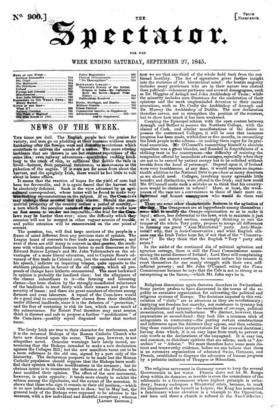NEWS OF THE WEEK.
THE times are dull. The English people lack the genius for variety, and men go on plodding at their business without much hankering after the foreign wars and domestic revolutions which contribute to enliven the annals of a nation. The more stirring incidents that are thrown in are but constant repetitions of the same idea : even railway adventures—speculation rushing, head- long to the crash of ruin, or collisions that 4abble the rails in blood—beciune, from perpetual recurrence, as ntonotonotts as the pulsation of the engine. If it were not for some fears about tho hiTve,st, and the sprightly Irish, there would he but little to talk about in home affairs.
It seems that the reaction of hopes for the yield of corn had been too favourable, and it is again feared that the harvest will i
be absolutely deficient. - Seek s the view advanced by an asTi- .Cultural correspondent, whose letter-will be found to make very -11rue-looking representations on the subject. If so, the Coen-laws may undergo their severest teat this winter. Should the com- mercial prosperity of the country outlast a period of scarcity,— a turn which the peculiar nature of the great public works now on foot seems to reLder not impossible,—the trial for ihe010110- laws may be harder than ever ; since the difficulty whichlhey occasion will not be merged in other vaguer sources of troulite, and public attention will be concentrated on the one point of contest.
The question, too, will find large sections of the peoplein a frame of mind different from any previous state of opinion. The League boast of converts to free trade among the farmers; and even if there are still many to convert in-that quarter, the readi- ness with which practical farmers listen to such discourses as Sir Edward Bulwer Lytton's and Mr. John,Tollemache's on the ad- vantages of a more liberal education, and to Captain Rous's ad- vocacy of free trade in Colonial corn, [see the amended version of his speech,] indicate an inquiring temper, quite opposite to the stubborn prejudices in favour of the old syona, which all pro- posals of change have hitherto encountered. The most backward In opinion is probably the landlord class : but the allegiance of the classes subordinate to it—the farming and labouring classes—has been shaken by the strongly-manifested reluctance of the landlords to treat fairly with their tenants and give the security of leases : and there are great numbers of electors among farmers and even labourers. A repeal of the Corn-laws would do a good deal to emancipate those classes from their thraldom under illiberal landlords, since it is the delusion of "protection," and the fear of venturing to risk its loss, which cause much of the subservience. Sir Robert Peel therefore may next session think it discreet and safe to propose a further " modification " of the Corn-laws—possibly repeal disguised under that modest name.


































